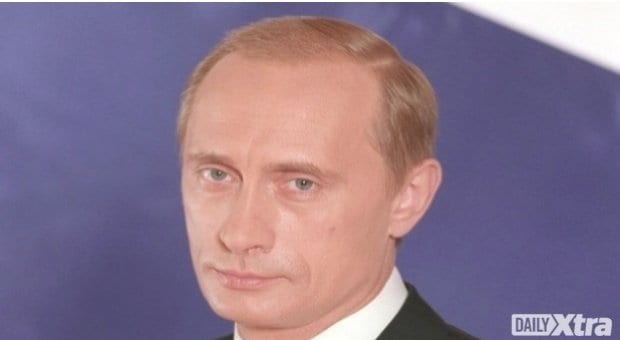It’s no secret that Russian President Vladimir Putin has criminalized public expressions of gay-friendliness to pander to his staunchly conservative constituency base.
The question is: has he been shocked by the Western world’s increasing outrage, or does it play right into his hands?
When Putin signed a law in early June blocking gay couples — and single people from countries with legal gay marriage — from adopting Russian children, most Westerners took it in stride, if they even noticed.
A few weeks later, when Putin signed a law outlawing direct and even indirect messages to youth that homosexuality may be tolerable, it made headlines across the Western world.
In a country whose capital already banned gay pride parades for the next 100 years, the new “anti-propaganda” law means anyone caught expressing any form of public support for gay people is now subject to a fine, two weeks’ imprisonment and, for foreigners, deportation.
It means teachers can no longer suggest to students that being gay is okay; parents presumably face the same penalties, or will soon enough.
All in the name of protecting traditional Russian values and boosting a reportedly sagging birthrate — not to mention Putin’s sagging political support, though it depends which polls you read and which opponents got sent to jail last week.
Amid allegations of electoral fraud, Putin won a third, non-consecutive (so presumably legal) presidential term in 2012, having played prime minister for a term between presidencies. He now rules uneasily against a backdrop of post-oil-boom economic stagnation, squelched civil liberties and growing disgruntlement.
It’s no wonder he’s turned to gays, among other minorities, in search of a handy scapegoat.
In March, The Moscow Times reported that homophobia is more widespread now than it was in Russia eight years ago. The Times cited a survey by the Russian Levada Center, which found that 89 percent of respondents said they have no gay friends or relatives; 16 percent thought gay people should be isolated from society; 22 percent suggested compulsory treatment; and five percent thought they should be “liquidated.”
Another Levada survey reportedly found that 76 percent of Russians support the anti-propaganda law.
As the West rises up in shocked outrage, Putin may be congratulating himself on a job well done, as he scores bonus points with his traditional support base, and especially the Russian Orthodox Church, for standing firm internationally on their conservative values.
Or maybe he’s cringing as he loses face in the run-up to the Sochi Games in February 2014. Or both.
So what should we, as an outraged community, do? Boycott the Games? Boycott Russian products? Pressure the International Olympic Committee to relocate the Games (as if)?
Personally, I’d rather support courageous gay athletes and allies going to the Games and publicly defying Putin on his home turf. Let’s not abandon Russia’s gay people under siege; let’s support them, visibly and vocally.
“Imagine this: it’s the opening ceremony of the 2014 Winter Games in Sochi, Russia. A huge television event, watched the world over,” writes New York Times columnist Frank Bruni. “And as the television cameras zoom in on Team USA, one of its members quietly pulls out a rainbow flag, no bigger than a handkerchief, and holds it up. Not ostentatiously high, but just high enough that it can’t be mistaken.”
In Bruni’s scenario, another American follows suit, then another and another. In mine, they are joined by athletes from countries around the world who, together, create waves and waves of rainbows.
“A gay-rights motif with a message,” Bruni says: “We’re here in Russia to compete, but we’re not here in Russia to assent.”
It’s a powerful image and the answer, I think, to the Games. The real question is: what comes next, when the cameras go home?
Robin Perelle is the managing editor of Xtra Vancouver.

 Why you can trust Xtra
Why you can trust Xtra


